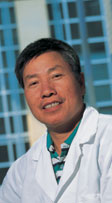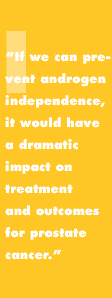 
Prostate
Progress
(continued)
But only for a while. With deadly cunning, prostate cancer cells
eventually adapt to an androgen-depleted environment. They become
androgen independent — able to grow without testosterone.
When this happens, few treatment options remain.
Ralph deVere White, director of the UC Davis Cancer Center, is a
leading investigator into androgen independence. “If we could
prevent it from happening,” he said, “it would have
a dramatic impact on treatment and outcomes for prostate cancer.”
Enter p53. P53 is a protein that is supposed to prevent normal cells
from proliferating out of control. When p53 fails to work, cancer
results.
DeVere White’s laboratory was the first to show that two out
of every three men with androgen-independent prostate cancer have
p53 mutations. While many in the field wrote this off as mere coincidence,
deVere White believed otherwise.
“It made no sense to me,” he said. “Why would
you presume p53 mutations are just along for the ride? It’s
been our belief that at least in some cases, those mutations are
allowing prostate cancer cells to live without androgen.”
To test the theory, deVere White and Shi experimented with a well-known
androgen-dependent prostate cancer cell line. They added a p53 mutation
known as R273H to the cell line, then waited to see what happened.
What they found confirmed their hypothesis. The line of cells, once
dependent on androgen, now grew in an androgen-free laboratory dish.
The cells also grew when injected beneath the skin of female mice,
which, by virtue of their gender, lack male hormones.
“To our knowledge, this is one of the first proofs that a
p53 mutation in prostate cancer cells confers androgen-independent
growth,” deVere White said.
  

Home |
Table of Contents |
To our Readers |
Building on Basics
Focusing on Patients |
In Translation |
First Steps
Campus Connection |
Benefactors |
News in Brief
UC Davis Health System |
© 2000, 2001, 2002 UC Regents. All rights reserved.
|
 |



 
 
|



